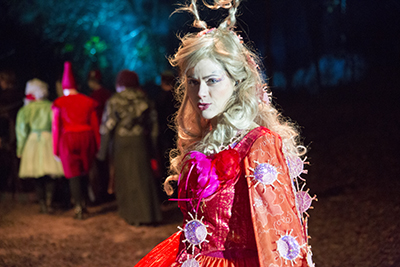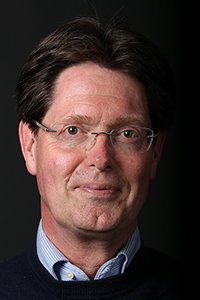Not a day without Shakespeare

He is the editor of the glossy magazine William, the title of which is a nod to the Dutch glossy Linda. Since 2013, William has appeared twice a year on the occasion of the famous, massively attended performances of Shakespeare in the open-air theatre Diever, in the Dutch province of Drenthe. Hans Jansen, study advisor for and lecturer in English, is also involved in these productions as dramaturge and advisor, as well as having provided the audience with expert introductions to the works performed for many summers and countless evenings. Moreover, Jansen regularly shares his knowledge of Shakespeare’s extensive oeuvre, which includes 38 plays and 154 sonnets, in theatres and schools across the country. In May this year he made his fifteenth trip with a group of students and others to Stratford-upon-Avon, the town where Shakespeare was born and where he died on 23 April 1616 at the exact age of 52. Like every year, the intensive programme included five visits to local performances, discussions afterwards, workshops and lectures. ‘Of course we also visit the famous places from Shakespeare’s life given that we are there anyway, but that’s really not my cup of tea; it’s a terrible tourist trap.’
Taboo
Jansen, who himself has ample amateur acting experience but has never got round to playing a Shakespeare role yet ‘for lack of time’, was especially anxious to see the performance of The Tragedy of Cymbeline in Stratford this year, a play that he had ‘only’ seen twice before. This tragedy is set in pre-Christian times, as is his favorite, King Lear. ‘What is special about this year’s version by the Royal Shakespeare Company is that Cymbaline is not a king but a queen.’ As revolutionary as that may sound, the language of today’s performances is still the same as four hundred years ago. ‘It is almost a taboo for the British and Americans to touch the language, even though most people hardly understand a word of the original anymore, and young people certainly don’t. The grammar, the meaning of words and expressions, word order... Without specialist study, the language is simply impossible. Besides that, the use of old language sometimes clashes with the stage design, which actually is modern a lot of the time, with mobile phones and all’, says Jansen. Dutch directors have an easier time, he says. ‘They use modern translations with immediate appeal, and they are often more resourceful when it comes to visual design.’
Sparkling
It is mainly this creative approach to Shakespeare’s literary legacy that has kept Jansen fascinated. ‘His work continues to inspire producers to emphasize different points, in part thanks to the enormous psychological depth of the protagonists. For example, I have seen Hamlet so often that I have lost count and have been surprised yet again so often. It was only after studying for a degree in English Language and Literature that Jansen discovered the true value of Shakespeare. ‘I used to dislike Shakespeare, as I was much more into the Middle Ages. Even my PhD thesis was about Medieval literature. But when I was unemployed after graduating in the early 1980s, I decided to pick up The Complete Works, and that sparked my enthusiasm.’
Shakespeare has received enthusiastic praise for his ability to stun both his readers and spectators, regardless of their level of education or socioeconomic circumstances, with sparkling language that moves from the sweet and exalted to the obscene, threatening and cruel. All that is pleasing, noble, disgusting and dark about life and about ‘us’ is reflected in the monologues and dialogues, which are full of lovely imagery, ambiguity, sounds and cadence.
However, Shakespeare’s rich language and impressive knowledge of human nature are not sufficient explanation of why his work is still widely played, according to Jansen. ‘His plays are technical marvels too, with an excellent sense of timing. Moreover, they are never set in the London of Shakespeare’s time, but always in a remote time and place, which is, in part, why they are so easy to transpose to the present.’
Noble motives
Jansen is strikingly sceptical about the noble motives and characteristics attributed to Shakespeare. Drama expert Loek Zonneveld, for instance, writes in the spring edition of the glossy William: ‘He did not engage in making propaganda (...). His main aim was to spark his audience’s curiosity about the various aspects of an issue or to sow serious seeds of doubt. He passionately stimulated his audience to gain new insights (...) He threw the smart alecks and know-it-all hardliners out on the street using both crude and subtle verbal violence.’ The BBC documentary Shakespeare and Us even praises the author’s great courage in mocking those in power and his gift of knowing exactly how far he could go in doing so. Hans Jansen sighs almost imperceptibly. ‘I am very down to earth on this issue’, he says. ‘We do not know anything about Shakespeare’s intentions. You might even say it was cowardly that he never chose sides and never portrayed all-too-recognizable figures. Or you might claim that his lack of stance was caused by his education; in those days, it was customary to empathize with the other party’s views in school debates. This might explain his aptitude for changing perspectives, which he perhaps also used for the simple reason of earning a living. In short, I do not know the depths of his soul, nor whether he was a gentle person and/or a shrewd businessman, a homosexual or not. And I don’t care. I care about the texts and the infinite possibilities they offer.’ That the Bard is still alive and kicking today is apparent not only from the large number of theatre, musical and film adaptations of his plays, but also from his ‘frequent pop-up appearances’ in daily life, says Jansen. ‘People quote him, whether they are aware of it or not, or refer to him in wordplay. Whenever I notice this, whether in the newspapers or on television, I can’t help but mumble “Shakespeare”, sometimes to the annoyance of my partner Willemien.’
King Lear
Why is King Lear Hans Jansen’s favorite? ‘It’s where Shakespeare goes deepest. The play offers excitement, horror, humour and love, but Shakespeare denies us all of it. He strips man of everything: power, love, civilization, his senses, knowledge and hope, only to confront the spectators with the inevitable after a brief upturn. It is the absurdism of Ionesco, Beckett and Pinter, all poured into one play and squared.’

Text: Annemarie Kok
Photos: Koen Timmerman / Shakespeare Theater Diever
Source: Broerstraat 5, the alumni magazine of the University of Groningen
| Last modified: | 19 March 2020 09.22 a.m. |
